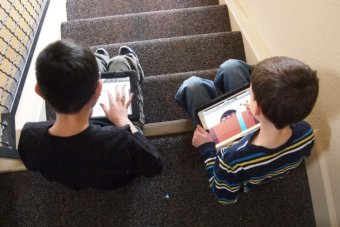Excessive use of electronic devices and a lack of time outdoors are two factors being blamed for an alarming increase in eye problems in children.
Profession Brien Holden, from the Brien Holden Vision Institute at the University of NSW, warned short-sightedness, or myopia, should not be underestimated.
“Putting your four-year-old in front of an iPad or other tablet device for four hours a day is a big issue in promotion of myopia, and we need to cut out as far as possible unnecessary almost recreational use of tablets,” he said.
Figures also showed the number of Australian teenagers with myopia had doubled over the past 15 years.
“I don’t want to be an alarmist but the fact of the matter is if we ignore our children becoming short-sighted, and increasing rapidly, they are at risk for future life,” Professor Holden said.
The World Health Organisation (WHO) enlisted Professor Holden’s institute to help mount an international campaign to raise awareness and to identify further areas of research.
The WHO is expected to release a report on the issue in the next month.
“So 15 years ago, myopia in children, say 17 years of age in Australia, was of the order of around 20 per cent incidence,” Professor Holden said.
“It’s now around 30 per cent, and this is world-wide trend.
“In Asia, for example, 96.5 per cent of Taiwanese boys aged 19 going into the army are short-sighted.
“And more than half of Asia is already short-sighted, and what we’re seeing is a trend towards both greater prevalence of myopia and much higher levels of myopia.
“And by 2050, more than half the world’s population will be myopic and there will be about a billion people who are highly short-sighted.
“So vision is blurred and it can be very long and very blue and that of course makes it very difficult for children to see, to learn, people to work, older people to survive.”
Time outdoors helps decrease risk and progress of myopia
While devices can be educators, and sometimes babysitters, parents are urged to limit the time kids spend staring at a screen.
Conversely, time spent playing outside is credited with decreasing the risk and progression of myopia.
Taiwan has moved to ban screen time for under-twos and restrict the time on devices for children up to the age of 18.
“Now that’s being very controversial and whether they can actually police that or not, there is such a concern about the damage being done to eyes long term or high levels of myopia,” Professor Holden said.
“The governments need advice, they need evidence as to what works and doesn’t.”

